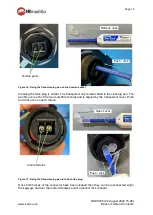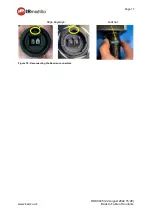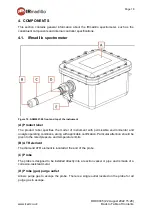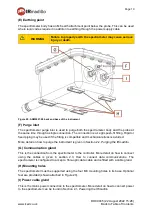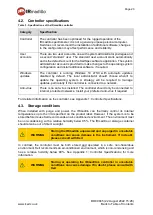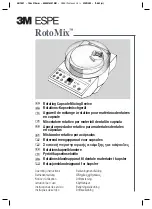
Page 5
DOC0945 (22 August 2022 15:28)
www.keit.co.uk
Back to Table of Contents
2. HOW TO POWER, PURGE AND CONNECT THE IRMADILLO
2.1. Powering the IRmadillo
NOTE
See Section 1 Safety prior to attempting installation.
The spectrometer is normally supplied with a blunt-cut mains cable to be wired into your
electrical supply. The instrument requires single-phase mains input and must be connected to
a permanent earth (grounding) connection. A 5A fuse should be fitted in the live/hot supply
connection.
The power supply needs to be fitted with a means of isolating both live and neutral by fitting a
disconnecting switch or using a suitable circuit breaker that meets the requirements of IEC
60947-1 and IEC 60947-3. The switch must be located within easy reach of the instrument
and must be marked as the disconnection device for the equipment. The disconnection device
must not interrupt the earth connection.
The spectrometer is designed to operate over a wide range of voltages shown below in
2 - IRmadillo power specifications
. If you plan to operate the spectrometer outside of these
ranges, contact Keit for advice before powering up the instrument.
Table 2 - IRmadillo power specifications
Parameters
Value
Units
AC input voltage
100-240
V
AC input frequency
50/60
Hz
Mains supply fluctuations (% of
Nominal Value)
±10
%
Power consumption
110 (max)
W
Overvoltage Category
CAT II
2.1.1. Uninterruptible power supply (UPS)
To ensure a reliable supply of power to the IRmadillo, we strongly recommend use of an
uninterruptible power supply (UPS). Contact support@keit.co.uk for further information.
If you are unable to use a UPS, you may find that the system fails to start correctly following
a power cut. In this situation, Keit recommends power cycling
first
the IRmadillo and
then
the
controller.
2.1.2. Power cable
The power cable for the IRmadillo is a permanently connected flying lead passed through a
cable gland; this is located at the rear of the spectrometer. The gland and cable must be
sufficiently protected from loading and twisting. The cable should ideally be routed above
ground to avoid accidental damage.

















